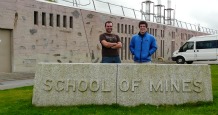
The award from the Society of Economic Geologists supports "study, research and teaching of the science of economic geology or for related projects".
CSM postgraduates awarded funding from the Society of Economic Geologists
Congratulations to PhD students Dan Parvaz and Ben Snook who have been awarded $2000 and $2500, respectively, by the Hugh E. McKinstry Fund of the Society of Economic Geologists for fieldwork and laboratory activities.
The Hugh E. McKinstry Award supports “study, research and teaching of the science of economic geology or for related projects,”.
Daniel Parvaz is currently in the second year of a PhD at the Camborne School of Mines. His research involves a re-examination of mines in Cyprus, with the aim of differentiating the weathered surface material (gossans) overlying copper rich, economic orebodies from those overlying copper poor, uneconomic orebodies. This will hopefully lead to the development of a low-cost exploration method for targeting copper deposits worldwide.
Graduating from the University of Leeds in 2009 with a Masters in Geosciences and a strong interest in geochemistry, economic geology, and fieldwork in warm places, he found that the research opportunity at CSM a perfect match!
Daniel is keen to foster links between industry, academia and undergraduates, and is the student representative on the Mineral Deposit Studies Group (MDSG) Executive Committee. He has established a student chapter of the Society of Economic Geologists (SEG) at the Camborne School of Mines, involving undergraduates, taught and research postgraduates and staff. He is also Captain of the CSM Sea Swimming Club.
Daniel will use the award to fund trace and rare-earth element analysis of rock samples from Cyprus by ICP-MS, and to attend the MDSG winter conference at Cardiff University in January 2012.
Ben Snook is currently in his first year of his PhD at Camborne School of Mines. Having studied both on the BSc Applied Geology and MSc Mining Geology programmes at the Camborne School of Mines, he went on to work for a gold exploration company in Brazil. Soon finding that he missed the mental challenge of research, he returned to Camborne School of Mines in September 2010 to begin his PhD entitled: ‘Developing exploration tools for high purity quartz and rare metals in the south Norwegian Bamble-Evje pegmatite cluster’.
This PhD aims to investigate the formation history of a series of pegmatites (extremely coarse grained granitic rocks) in the south of Norway. Ben additionally aims to determine the reasons behind the occurrence of high purity quartz, which has burgeoning uses in electronics and solar panels, and rare earth elements, which are a vital component of high performance magnets (e.g. neodymium magnets used in wind turbines) and a wide assortment of other electronic devices.
Ben is extremely grateful to the SEG for selecting him as part-recipient for this fund, awarding him $2500 which will be used to finance a 2 week trip to Trondheim this May to perform chemical analyses, followed by 3 weeks’ fieldwork to carry out mapping and sampling. The results of the study are expected to be published in leading international earth science journals.
Date: 10 May 2011
